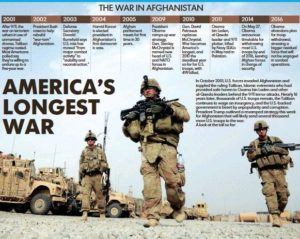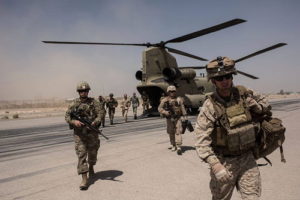 “America’s longest ever war.” That’s how our involvement in Afghanistan is often described (especially by those who would like to see us get out as soon as possible.)
“America’s longest ever war.” That’s how our involvement in Afghanistan is often described (especially by those who would like to see us get out as soon as possible.)
In my humble opinion, that description is somewhat dubious when one considers, for example, that we’ve had significant numbers of troops in South Korea since before I was born in the early 1950s. Granted, actual military confrontation in Korea is limited, but Kim Jong-un, and his father and grandfather before him, have not only huge military forces, but provocative policies and tactics which have kept our military on its toes there for decades.
 Afghanistan of course is where the Taliban allowed Al-Qaeda to conspire and prepare to attack the United States so brutally and mercilessly on September 11, 2001. President Bush made it very clear that any nation that allowed itself to harbor terrorists was against us, not with us, and proceeded to militarily remove the Taliban, and their Al-Qaeda clientele from power.
Afghanistan of course is where the Taliban allowed Al-Qaeda to conspire and prepare to attack the United States so brutally and mercilessly on September 11, 2001. President Bush made it very clear that any nation that allowed itself to harbor terrorists was against us, not with us, and proceeded to militarily remove the Taliban, and their Al-Qaeda clientele from power.
Now the question we’re facing is, do we need to leave troops in Afghanistan to maintain that hard-fought “peace” – and if so, how many? At one time, when it was more of a shooting war, we had upwards of 100,000 military personnel there. Now we’re down to 4500. And President Trump announced recently that he intends to take that number down to 2500 by the time our next president is sworn in on January 20, 2021.
This concerns me a great deal. Here’s why. The current level of 4500 troops is about the minimum number of troops in a country the size and complexity of Afghanistan to accomplish much of anything. At 4500, we can still gather important intelligence to discourage future terrorist attacks. We can also continue to train Afghan troops to be more and more capable of defending themselves against future Taliban attacks, rather than depend so much on us. At 4500, our troops have sufficient resources for force protection (protecting themselves from being attacked.) At 2500, our troops will be capable of doing little more than force protection. So what’s the point of being there at all?
 It’s my view that whereas we’d love to be able to reduce our level of troop commitment across the globe, including in Afghanistan, maintaining vital US interests requires a sufficient number of troops deployed and appropriate funding to support them. The US is the principal force for peace and security across the globe, and it is in our national interest to continue in that tradition.
It’s my view that whereas we’d love to be able to reduce our level of troop commitment across the globe, including in Afghanistan, maintaining vital US interests requires a sufficient number of troops deployed and appropriate funding to support them. The US is the principal force for peace and security across the globe, and it is in our national interest to continue in that tradition.
That doesn’t mean that we need to support “endless foreign wars” or “be the world’s policeman.” But if not us, who? Our European allies have shown little indication of being willing or able to do what is necessary, other than giving us lukewarm support through the UN, or NATO, or on a case-by-case basis. And whereas Russia, and China, and Iran are only too willing to get involved, it’s almost always in a less than helpful capacity (Russia in Syria for example.)
So even though it might sound nice to hear things like “let’s have our troops home by Christmas” let’s never forget what happened when President Obama decided to pull all our troops out of Iraq – the rise of ISIS and the deaths of far too many innocent people.

